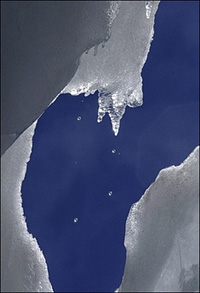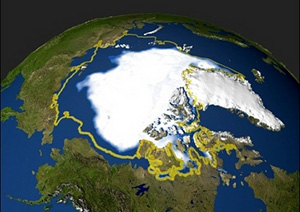 |
 |
 |
 Editorials | Environmental | September 2006 Editorials | Environmental | September 2006  
Meeting Tries to Bring Poor Nations Onboard Climate Change Pact
 AFP AFP


| | A melting glaciar in Ecuador. About 40 countries have begun a meeting in Switzerland to discuss bringing developing nations on board emissions curbs and international measures to control climate change. (AFP/Jorge Vinuenza) |
About 40 countries have begun a meeting in Switzerland to discuss bringing developing nations on board emissions curbs and international measures to control climate change.

At least 17 developing nations, including major emerging economies China, Indonesia, South Korea, South Africa, and Brazil, were taking part in the two-day informal meeting behind closed doors on the outskirts of Zurich, the Swiss environment ministry said.

Ministers from 25 nations were due to join the gathering headed by Switzerland and Kenya, which is part of a process aimed at agreeing on the next phase of measures and targets to cut greenhouse gas emissions from 2012 to 2017.

The current UN climate change convention requires industrialised countries that have ratified it to trim outputs of carbon dioxide (CO2) and other gases that trap solar heat and could wreak havoc with the planet's delicate climate system.

The Kyoto Protocol came into force last year, setting targets for the period until 2012. The world's largest source of emissions, the United States, pulled out of the process beforehand.

One of Washington's objections was that major emerging industrial rivals like China were not included in the curbs, which affect industrial, transport and household emissions primarily caused by burning coal or oil.


| | NASA satellite image shows the minimum concentration of Arctic sea ice that occurred in 2005. A study in the latest issue of Geophysical Research Letters has shown that year-round Arctic sea ice has shrunk by one seventh between 2004 and 2005, a dramatic event that could herald a vicious regional circle of warming. (AFP/NASA) |
"We want to reinforce the dialogue launched last year in Montreal, by concentrating on reduction actions, which would be possible in all countries," Swiss environment minister Moritz Leuenberger said in a written copy of his speech to the meeting.

Technical or financial support for developing countries to cut emissions and deal with any impact of climate change was also on the agenda.

"This support has to take account of the priorities for Africa and other developing countries. Such priorities will be an important subject of discussions here in Rueschlikon, and in Nairobi in November," Leuenberger said.

Formal talks are due at the United Nations climate change conference in Kenya on November 6 to 17, but the process is expected to take years to complete. | 
 | |
 |



